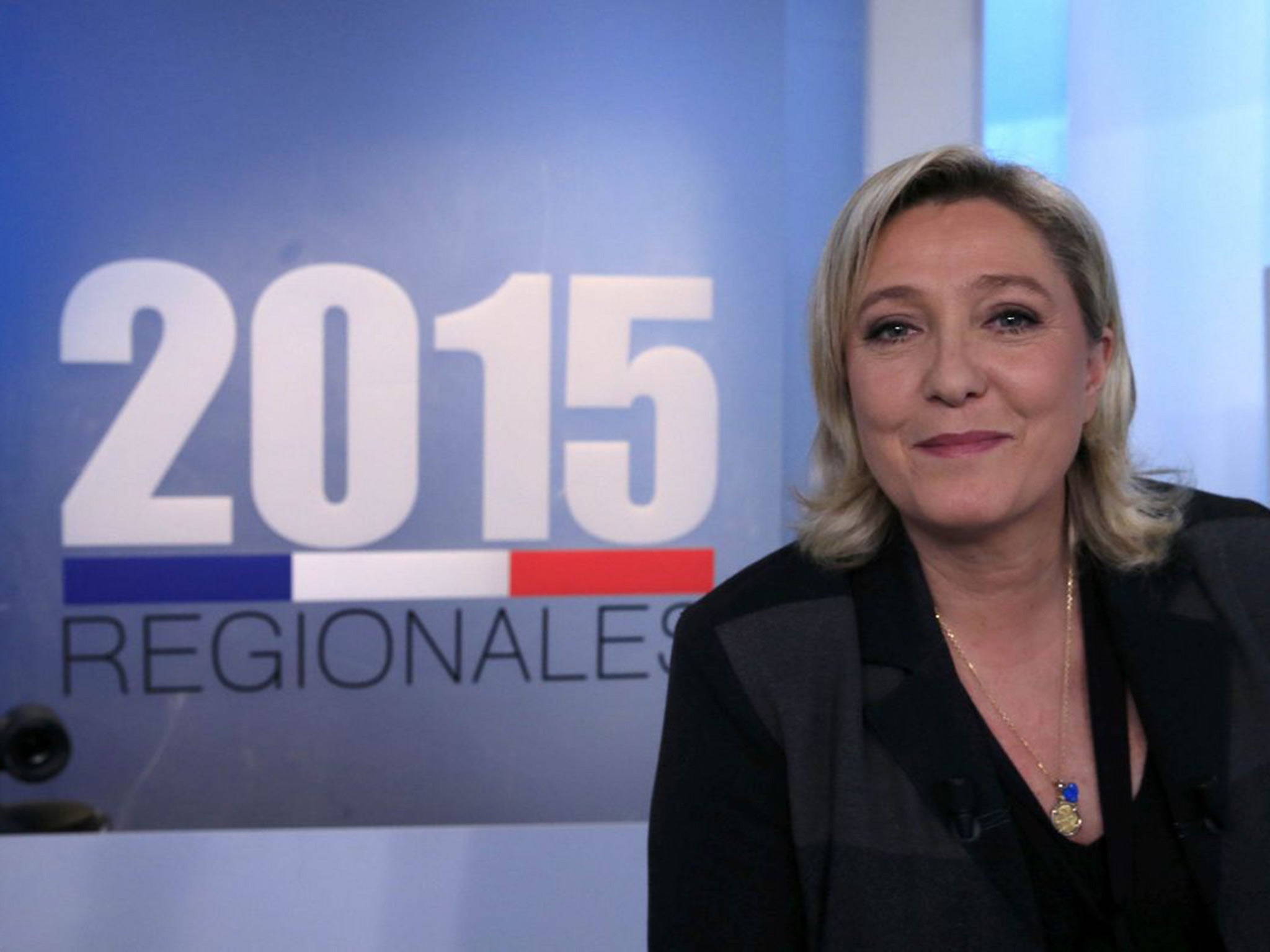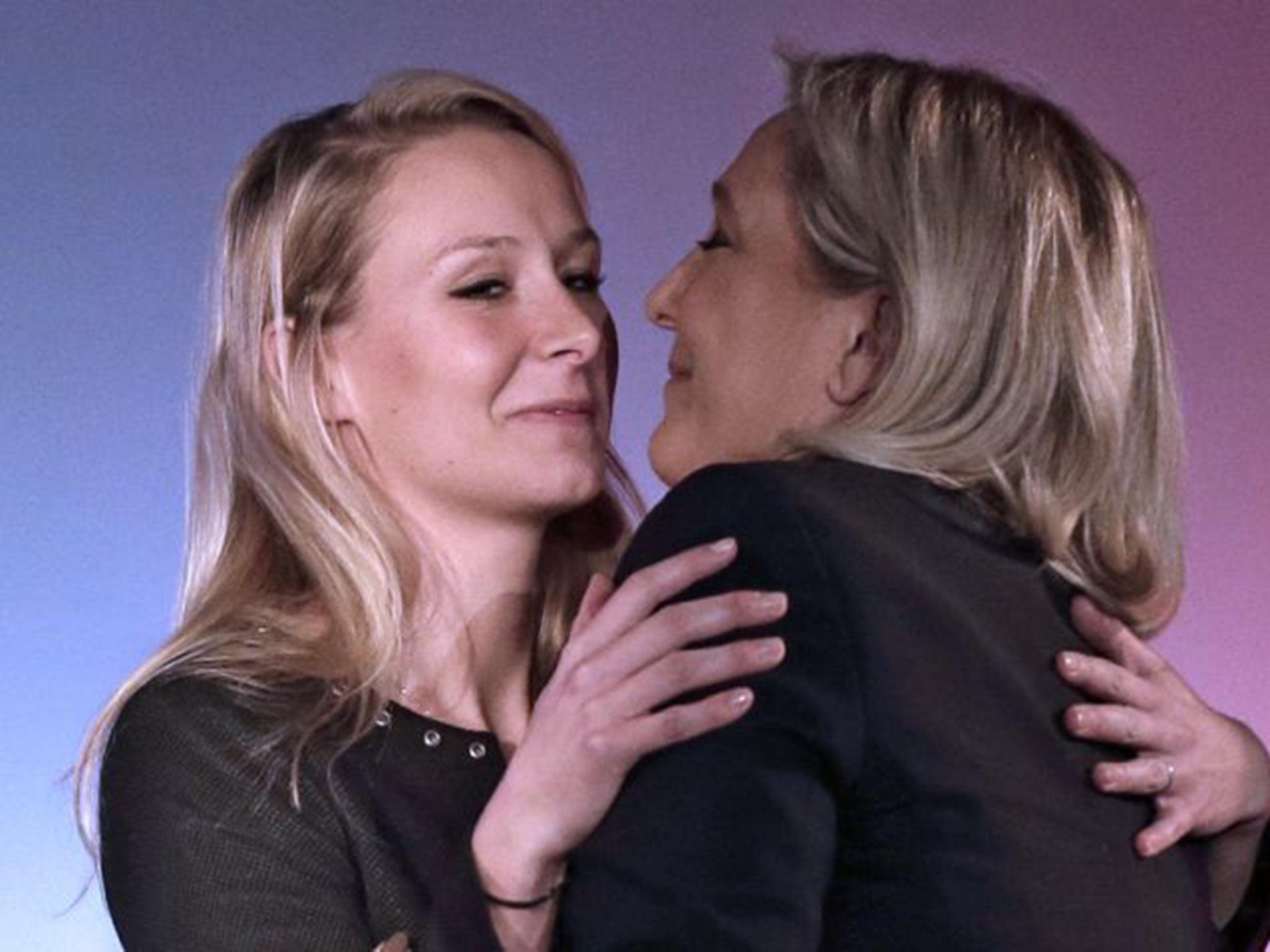Front National: Marine Le Pen and Marion Maréchal-Le Pen expect electoral breakthrough for France’s far-right
After the Paris atrocities, the ‘anti-Muslim’ far right is forecast to take over swathes of France. What can stop it?

A 26-year-old woman who says that Muslims cannot be French may be about to be elected president of a large region sprawling from Marseille to Nice and the Italian border.
A 47-year-old woman – aunt of the first, and the leader of Europe’s most powerful far-right party – is likely to be the next president of another big chunk of France, starting a few miles from Kent and stretching almost to the northern suburbs of Paris.
If opinion polls are to be trusted, the Front National will make a spectacular breakthrough in a two-round regional election on Saturday and next Sunday.
In the wake of the 13 November atrocities in Paris, the polls predict an unprecedented surge of support for the xenophobic, anti-European and protectionist FN in all regions except, paradoxically, the Île-de-France around the capital.
Marine Le Pen, the party leader, seems almost certain to be elected president of a new super-region covering industrial northern France and Picardy – for decades a fiefdom of the left. Marion Maréchal-Le Pen, her niece, is predicted to take Provence-Alpes-Côte d’Azur – a traditional bastion of Nicolas Sarkozy’s centre-right.
The Front National also looks likely to top the first-round poll in six out of the 12 “super-regions” created last year. The far right has a chance of forming governments in another two – Alsace-Lorraine in the east and Languedoc-Roussillon in the south.

The FN, supposedly “cleaned up” but increasingly displaying its authoritarian and xenophobic colours, has never controlled any French region before. Control of two or more regions would give Ms Le Pen a powerful platform on which to challenge for the presidency of the whole of France in 2017. Polls continue to suggest, however, that the higher turnout in a nationwide election would see Ms Le Pen comfortably defeated by any mainstream rival in the two-candidate, second-round run-off for the Élysée Palace.
Recent events – from the migrant crisis to the Paris attacks – amount to a “machine for making FN votes”, says the historian of the French far right, Nicolas Lebourg. The dignified and defiant response of most of the French media and the metropolitan elite disguises a more visceral reaction – anti-Muslim, rather than anti-Islamist – in much of provincial, blue-collar and middle-class France.
Ms Maréchal-Le Pen, emboldened or intoxicated by her polling numbers, has made a series of frankly xenophobic speeches in recent days which seem to challenge her aunt’s attempts to fumigate the party. Last Tuesday she said that Muslims could “not truly be French” because they did not share the “customs and lifestyle” of France’s “Christian heritage”.
The results, if the polls are right, will be a stinging blow to the ruling Socialists and President François Hollande. Despite a leap in his popularity after his sure-footed handling of the Friday 13th attacks, Mr Hollande’s centre-left will lose several regions – and above all the great blue-collar heartland of the industrial north around Lille and Calais.
The results will, arguably, be even more disastrous for Mr Sarkozy, the former President and leader of the centre-right Les Républicains, who hopes to challenge Mr Hollande for the presidency in 2017. With record unemployment and the French economy reacting sluggishly to Mr Hollande’s plodding reforms, Mr Sarkozy had expected to triumph in this month’s elections.

The former President insists that tomorrow’s first round results will shame the pollsters and pundits and produce a series of triumphs for his centre-right party. The left also hopes Mr Hollande’s abrupt (and probably short-lived) popularity will encourage disillusioned centre-left voters to turn out.
Under election rules, the party first past the post in the second round gains a “bonus” of 25 per cent of the regional council seats. In tomorrow’s first round, the FN is predicted to be far ahead, with about 40 per cent of the vote, in Lille-Calais-Amiens and Marseilles-Cannes-Nice.
It would take an agreement by the centre-right and centre-left to combine forces to stop the FN winning outright next week. The Prime Minister, Manuel Valls, has suggested such an alliance. Mr Sarkozy, and many barons of the left, have rejected the idea out of hand.
Bookmark popover
Removed from bookmarks